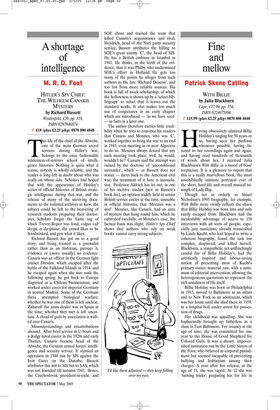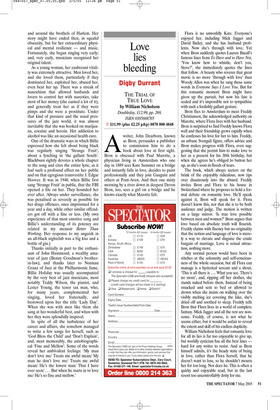Fine and mellow
Patrick Skene Catling
WITH BILLIE by Julia Blackburn
Cape, £17.99, pp. 354, ISBN 0224075896
✆ £15.99 (plus £2.25 p&p) 0870 800 4848 Having obsessively admired Billie Holiday’s singing for 50 years or so, having seen her perform whenever possible, having listened to her recordings again and again, and having read hundreds of thousands of words about her, I received Julia Blackburn’s With Billie in a mood of blasé scepticism. It is a pleasure to report that this is a really marvellous book, the most uninhibitedly intimate portrayal ever of the short, hard life and overall musical triumph of Lady Day.
Though not as orderly as Stuart Nicholson’s 1995 biography, for example, With Billie more vividly reflects the chaos that Billie Holiday was born into and only rarely escaped from. Blackburn had the incalculable advantage of access to 150 interviews with all sorts of people, especially jazz musicians, already transcribed by Linda Kuehl, who had hoped to write a coherent biography, found the task too complex, despaired, and killed herself. Blackburn, a sympathetic yet unflinchingly candid fan of Billie Holiday’s, had the artistically inspired and labour-saving notion of presenting most of Kuehl’s primary-source material raw, with a minimum of editorial intervention, allowing the heterogeneous quotations to represent the rich untidiness of life itself.
Billie Holiday was born in Philadelphia in 1915, moved to Baltimore as an infant and to New York as an adolescent, which was her home until she died there in 1959, in a hospital bed, under arrest for possession of drugs.
Her childhood was appalling. She was haphazardly brought up fatherless in a slum in East Baltimore. For truancy at the age of nine, she was committed for one year to the House of Good Shepherd for Colored Girls. It was a dreary, impoverished institution run by the Little Sisters of the Poor, who believed in corporal punishment but seemed incapable of preventing bullying and lesbianism among their charges. A year after her release, at the age of 11, she was raped. At 12 she was ‘turning tricks’, preparing her for life in and around the brothels of Harlem. Her story might have ended then, in squalid obscurity, but for her extraordinary physical and mental resilience — and music. Fortunately, she began singing very early; and, very early, musicians recognised her original talent.
As a young woman, her exuberant vitality was extremely attractive. Men loved her, and she loved them, particularly if they dominated her, exploited her, abused her, even beat her up. There was a streak of masochism that allowed husbands and lovers to control her with narcotics, take most of her money (she earned a lot of it), and generally treat her as if they were pimps and she were a prostitute. Under that kind of pressure and the usual pressures of the jazz world, it was almost inevitable that she was hooked on marijuana, cocaine and heroin. Her addiction to alcohol was like an occasional health cure.
One of the dramatic ways in which Billie expressed how she felt about being black was regularly singing ‘Strange Fruit’, about a lynching in ‘the gallant South’. Blackburn rightly devotes a whole chapter to the song and cites the entire lyric, as it had such a profound effect on her public and on that egregious transvestite J. Edgar Hoover. It was in 1940, when Billie first sang ‘Strange Fruit’ in public, that the FBI opened a file on her. They hounded her ever after. Always under surveillance, she was penalised as severely as possible for her drugs offences, once imprisoned for a year and a day, while other similar offenders got off with a fine or less. (My own experience of that most emotive song and Billie’s understanding of its potency are related in my memoir Better Than Working. Her response to my anguish in an all-black nightclub was a big kiss and a bottle of gin.) Thanks initially in part to the enthusiasm of John Hammond, a wealthy amateur of jazz (Benny Goodman’s brotherin-law), and thanks later to Norman Granz of Jazz at the Philharmonic fame, Billie Holiday was usually accompanied by the very best of jazz musicians, most notably Teddy Wilson, the pianist, and Lester Young, the tenor sax man, who, for many years, complemented her singing, loved her fraternally, and bestowed upon her the title ‘Lady Day’. When she was with men like them she sang at her wonderful best, and when with her they were splendidly inspired.
In spite of all the turbulence of her career and affairs, she somehow managed to write a few songs for herself, such as ‘God Bless the Child’ and ‘Don’t Explain’, and, most memorably, the autobiographical ‘Fine and Mellow’. Some of the words reveal her ambivalent feelings: ‘My man don’t love me/ Treats me awful mean/ My man he don’t love me/ Treats me awful mean/ He’s the lowest man/ That I have ever seen/ . . . But when he starts in to love me/ He’s so fine and mellow.’




























































 Previous page
Previous page